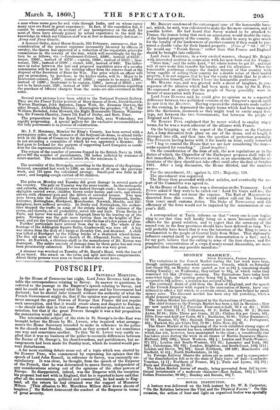POSTSCRIPT.
SATURDAY MORNING.
In the House of Commons last night, Lord Two: RUSSELL laid on the table the correspondence relating to Savoy. In answer to questions, he referred to the passage in the Emperor's speech relating to Savoy, and said he could not go beyond what the Emperor and his Government had declared ; but he should infer himself, without the authority of what the French Government might do, that if the opinion was general and unani- mous amongst the great Powers of Europe that France did not require such annexation, and that it would create alarm and disquiet to Europe, —he should infer that in that case France would not proceed to such an- nexation, but that if the great Powers thought it was a fair proposition the annexation would take place. The interminable subject of the riots in St. George's-in-the-East was brought before the House by Mr. LYGON, who inquired what arrange- ments the Home Secretary intended to make in reference to the police in the church next Sunday, inasmuch as they seemed to act sometimes one way and sometimes another. To this Sir G. Lewis very curtly re- plied that it was no business of the police to reconcile differences between the Rector of St. George's, his churchwardens, and parishioners, but ar- rangements had been made for Sunday next, which he trusted would pre- vent disturbances.
--A far more exciting debate arose out of a topic which was started by Sir ROBERT PEEL, who commenced by expressing his opinion that the speech of Lord John Russell, in reference to Savoy, was eminently un- satisfactory. It was clear, he thought, from the speech of the Emperor of the French, that he was determined to annex Savoy, independent of any considerations arising out of the opinions of the other powers. of Europe. So disappointed, indeed, was the Emperor with the reception his proposal had met with in England, that he is reported to have said that after all the concessions, political and commercial, he had made to Eng- land, all the return he had obtained was the support of Monsieur Milnes. [This allusion to Mr. Monckton Milnes drew down shouts of laughter.] Sir Robert denounced the conduct of the Emperor in terms of great severity. Mr. BRIGHT condemned the extravagant tone of the honourable baro-
net, which, he said, was calculated to make the fire more extensive, and if possible hotter. He had heard that Savoy wished to be attached to France, the reason being that such an annexation would double the value of the landed property of the country. He should be sorry to give much for the loyalty of the landowners of another country if they could be pro-
mised a double value for their landed property. (Cries of " Oh ! Oh r') He would say "Perish Savoy," rather than that France and England should be brought into collision.
Lord JOHN MANNERS, in a very excited manner, charged Mr. Bright witti interested motives in connexion with his new-born zeal for France.
"Give him," said the noble Lord, "4d. where before he got 2d., and that will at once make him transfer his loyalty and his allegiance. When the honourable gentleman charges the landed interest of this country with being capable of selling their country for a double value of their landed property, I do not suppose that he has the vanity to think that he is above that suspicion himself, and there I leave the honourable gentleman."
Mr. MILNES rose, and was greeted with a shout of laughter, in con- sequence of the allusion which had been made to him by Sir R. Peel. He expressed an opinion that the people of Savoy generally were in favour of annexation with France.
Lord Joon RUSSELL said he could give no opinion as to a reported difference between two published versions of the Emperor's speech until he saw it in the Mowiteur. Having repeated the statements made earlier in the evening, he deprecated the angry terms which had been imported into the discussion' inasmuch as they might tend to excite angry feel- ings, not between the two Governments, but between the people of England and France.
Sir ROBERT PEEL explained that he never wished to employ angry terms, for he was a warm adherent of the alliance with France.
On the bringing up of the report of the Committee on the Customs Act, a long discussion took place on one of the items, and at length it
diverged into silk, and then into the question of protection generally. The SPEAKER having borne with it for nearly an hour, coolly remarked —" I beg to remind the ouse that we are now considering the item— corks squared for rounding." (Loud laughter.)
On the consideration of the item of silk, the new regulations as to the duties of which, the Chancellor of the Exchequer proposes shall take ef-
fect immediately, Mr. NEWDEGATE moved, as an amendment, that the al- terations of the duty should not take effect until after the first of October 1861. After a long discussion, the House diivded, and the numbers were—
For the amendment, 51; against it, 179; Majority, 128. The amendment was negatived. The House then proceeded with other articles, and eventually the re- port of the Committee was agreed to.
In the House of Lords, there was a discussion on the Yeomanry. Lord Powis asked if they were to be called out ? Lord DE Glair said no ; the Government would not incur the expense. The Earl of blei.mrsnuav dissented from this course. He would rather call out the Yeomanry than remit small customs duties. The Duke of NEWCASTLE said the efficiency of the force would not be impaired by the intermission of one year's drill.


























 Previous page
Previous page